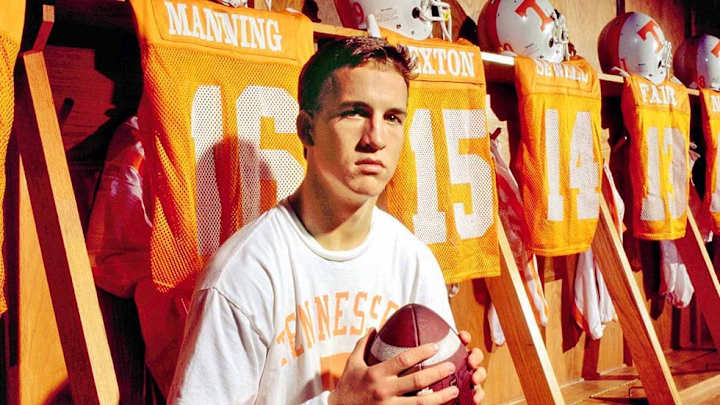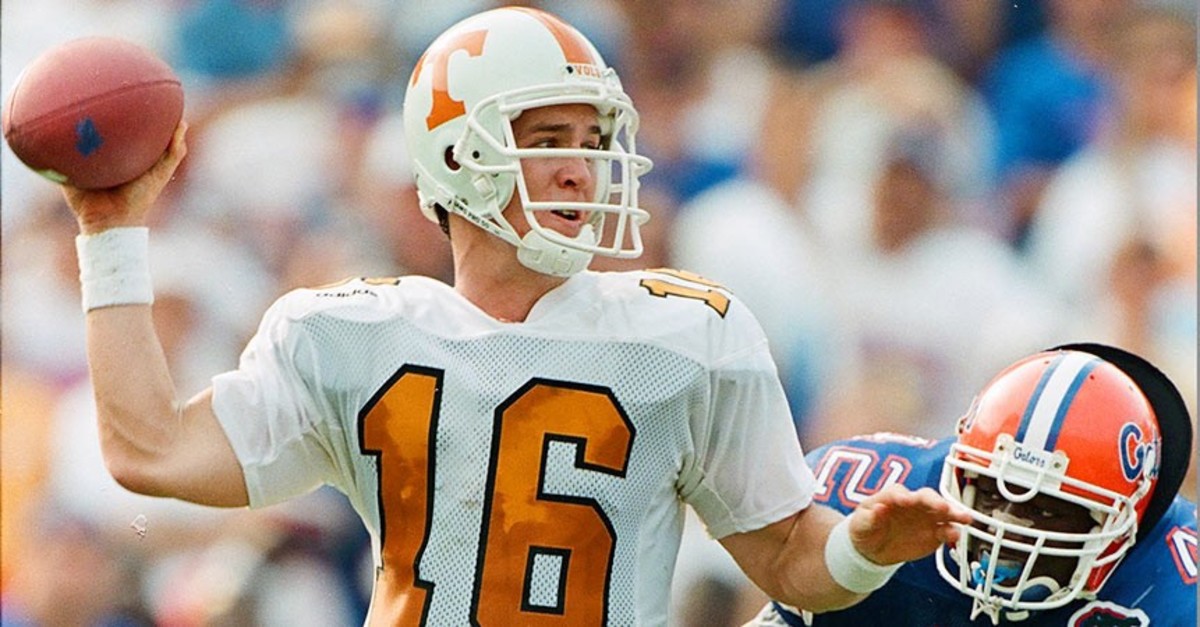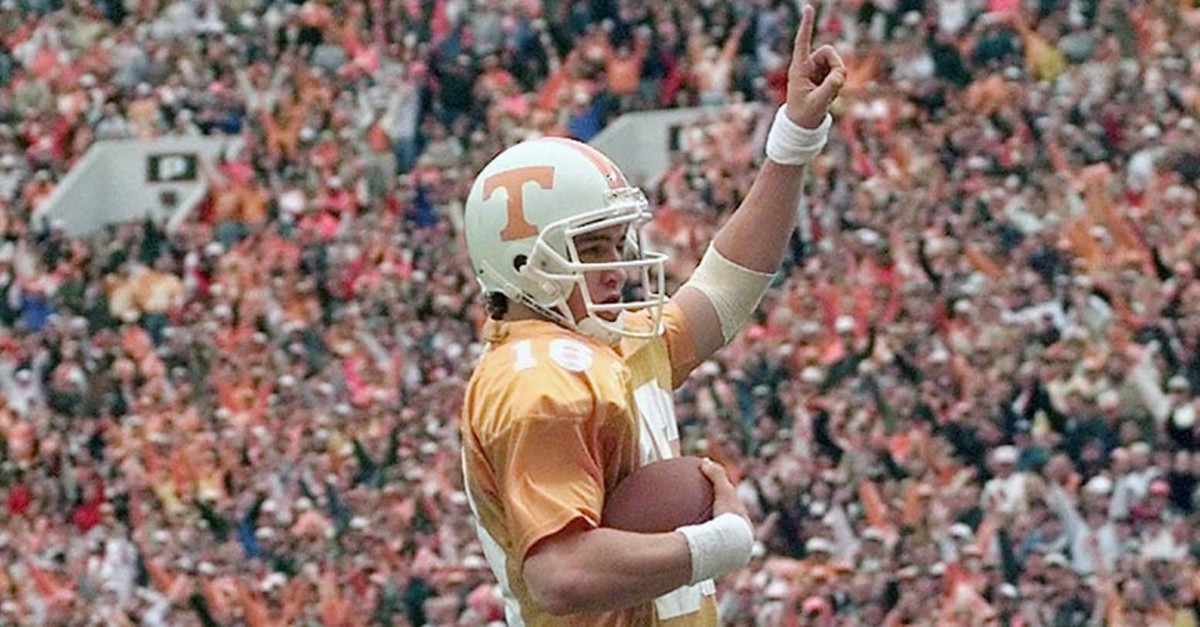The dawn of the legend: Remembering Peyton Manning's time as a Tennessee quarterback sensation

[video: 13724957]
The Denver Broncos announced Sunday that Peyton Manning would retire from the NFL after 18 seasons. He leaves pro football as a two-time Super Bowl winner, a five-time MVP and the league's all-time leader in passing touchdowns and passing yards. But long before putting a bow on an illustrious career with his second Super Bowl victory, Manning made a name for himself as a prolific quarterback in the SEC.
In 1994 Manning arrived at the University of Tennessee as a blue-chip prospect out of New Orleans. The son of Ole Miss legend Archie Manning, Peyton went on to author his own stellar collegiate career. He went 39–5 as a four-year starter at Tennessee, throwing for 11,201 yards—just the fourth quarterback in NCAA history to eclipse 11,000 yards—and 89 touchdowns.
After his junior season in 1996, Manning flirted with leaving school early for the NFL draft. But the rising senior opted to return to Knoxville and helped the Volunteers win the '97 SEC title. That season Manning claimed the Maxwell Award, the Davey O'Brien National Quarterback Award and the Johnny Unitas Golden Arm Award. He finished second in Heisman Trophy voting to Michigan cornerback Charles Woodson and became the No. 1 overall pick in the '98 NFL draft.
SI.com asked several individuals who played and coached with and against Manning to share memories of his college career at Tennessee.
Phillip Fulmer
Then: Head football coach, University of Tennessee
Now: Partner, BPV Capital Management
Peyton was one of the top high school quarterbacks in the country. On tape, he was in control, in command of the ball, and he just looked the part of a drop-back quarterback. Our offense interested Peyton because we were throwing the ball, and we could adjust to the ability of the quarterback. Looking back, I was just elated Peyton was interested in Tennessee. I never really felt pressure in coaching Peyton; Archie and Olivia probably caught the brunt of it. But I still get grief from my Mississippi friends from time to time.
Seven plays into the 1994 season-opening game against UCLA, we lost [starting quarterback Jerry] Colquitt to a season-ending injury. A few weeks later Todd [Helton] gets his knee tweaked against Mississippi State. All the sudden, Peyton's in the game. ... One of Peyton's first balls in the game after Todd's injury was an out route from one hash to the opposite sideline. He hit one of our receivers, Kendrick Jones, and it was just a rope. I'd seen it in practice, but this was for real.
Peyton had been in so many locker rooms growing up, watching tape and listening to his dad, coordinators and head coaches. That could have made him think he knew it all, but he didn't. He just wanted to learn. You never wanted to tell Peyton one thing and then tell him something else later, because he'd have the notes. He'd say, "Coach, let's go back and look at that." Then I'd have to say, "Well, okay." He was so meticulous with his notes.
I think Peyton is respected as one of the best to ever play in the SEC, if not the best. He took Tennessee to another level. I don't mean anything negative by this, but even though we didn't win a national championship with Peyton, in a lot of ways we won a national championship [in 1998] because of Peyton.

Sporting News via Getty Images
Steve Spurrier
Then: Head football coach, University of Florida
Now: Retired
Our Florida team in 1994 already had Danny Wuerffel, who had played well as a redshirt freshman the year before, but we still recruited Peyton. He visited campus and I visited his home in New Orleans. But one morning one of my assistant coaches, Bob Sanders, who recruited Louisiana, came in and said, "Coach, Peyton is going to Tennessee." I looked at him and said, "Well, that's probably the best place for him to go." And he sure looked at me funny.
But shoot, we had Danny Wuerffel, Eric Kresser, Terry Dean—we had some good quarterbacks at that time. Peyton was able to go to Tennessee and start all four years. He and Danny were certainly two of the best to ever play in the SEC. You can have too many quarterbacks when they're both great like Peyton and Danny.
I can tell you about every game we played against Peyton. In '94, we went to Knoxville and had a really good team. We beat them 31–0, but they put Peyton in with maybe four or five minutes left in the fourth quarter. Archie likes to tell the story that when Peyton got in the huddle, he said, "All right fellas, let's go! Let's go! Let's go get us a touchdown!" One of the Vols' linemen looked at Peyton and said, "Shut the heck up and snap the ball!" Archie tells that story a lot better than I do.
Some people in Gainesville say the '95 game is one of their favorite Florida games of all time. Tennessee had us 30–14 with about two minutes left in the first half, Peyton was throwing the ball up and down the field. We scored right before the half to make it 30–21. Then we proceeded to score six touchdowns on our next six possessions. We beat them 62–37, as it ended up.
In '96, there was a lot of hype in Knoxville about us. We hit some big plays, got a turnover and suddenly we're up 35–0 with 12 minutes left in the second quarter. But Peyton threw for about 480 or 490 yards. I think he set a school record.
The next year in '97, we beat Tennessee 33–20 in the Swamp. But we proceeded to lose two games to LSU and Georgia. Tennessee won the rest of their games and beat Auburn for the SEC championship. So Peyton got himself a conference championship. We always scored a bunch of points in those games against Peyton, but he played super.
Joe Harrington
Then: Sports Video Coordinator, Tennessee Athletics
Now: Sports Technology Coordinator, Tennessee Athletics
When Peyton first walked on campus in the summer of '94, he loved to watch film, and nobody wanted to watch film. [Then-UT offensive coordinator David] Cutcliffe brought Peyton around and told me Peyton was interested in going through our archives. I had a tape archive we could choose from. Peyton would pick out tapes, go into a room and watch them. I'd never seen a player who wanted to watch film like he did.
Peyton eventually got his own VHS machine in his room. I had a VHS machine in my office, so I could make copies of things. Peyton would have his own library: Games, practices, everything—we made copies of it all for him. He'd have an unbelievable number of tapes in his room, and twice a year he'd bring them back to me in garbage bags. And—I swear I'm not making this up—none of his tapes were rewound to the beginning. Every single one was wound to the middle. I think he didn't rewind them because he wanted to prove to me that he'd watched them all. We'd go through those bags and assume there were a few he didn't watch. But there never were.
Every year during the Broncos' open date, Peyton would call me for something Tennessee-related from his time here, so he could use it in their meetings in Denver. Each time he called, he would always know which play he was looking for, which game it was and when it happened. He's like Rain Man in that respect. He could remember the play before and the play after.

Mark Humphrey/AP
Jeff Hall
Then: Redshirt junior placekicker, University of Tennessee
Now: Certified Financial Planner, Rather & Kittrell, Inc.
There's a difference between a leader and an entertainer. I think a leader manages the spotlight and embraces it for what it is, and I think an entertainer seeks it out. Peyton managed the spotlight. He knew the expectations. He saw that as his responsibility.
I remember watching Peyton warm up, the different things he would do week-in and week-out just to prepare for practice. He was very methodical and very consistent. As a kicker, you have to prepare yourself mentally, as well. So it was really an encouragement for me because I watched how he prepared and I took a little bit of the same approach. Peyton encouraged a lot of us other guys to approach it the same way. It certainly led to a lot of wins while I was at Tennessee.
I can still remember coming up for two-a-days, the very first time I watched him throw. Being a kicker, you're not really analytical with quarterbacks. But I remember watching him throw and saying to myself, Wow. I'd never seen someone throw a football like that.
Bud Ford
Then: Assistant Athletics Director for Sports Information, University of Tennessee
Now: Retired
In my mind, Peyton is probably the most popular player to ever play at Tennessee. UT had the first black quarterback in the SEC in Condredge Holloway, who was very popular, and then quarterback Heath Shuler, who finished second in Heisman Trophy voting in 1993. Then Peyton comes along. Even though the Vols won the national championship in '98—the year after Peyton left—with Tee Martin at quarterback, Tee was certainly a great player, but I don't think his popularity ever equaled that of Peyton.
People don't want to believe Peyton Manning is who he is, but he is who he says he is. Everyone thought he came back for his senior year at Tennessee to win the Heisman Trophy. That's about as far from the truth as anything. He came back to win a championship, which he did by helping Tennessee win the SEC in '97. That year we won the SEC title game over Auburn, and by then Peyton had learned he was going to New York for the Heisman ceremony. I remember Peyton came up to me and said, "What happened on the field today was what's important. We won a team championship. Now we're going to New York and we're going to have a good time, no matter what happens." He told me to quit worrying about it, so that's what we did.
After Michigan cornerback Charles Woodson won the Heisman, Peyton stayed in the media session for almost an hour and a half. A couple of the other guys did some time and left, but I'm almost certain that next to Woodson, Peyton was the last guy to leave. Afterwards we had a group dinner in New York as if it was a celebratory kind of thing, even though it wasn't.
This is how precise Peyton is: We were taping a TV spot one morning, and Peyton had come directly from his house. He told me he was hungry and asked if I'd run down to McDonald's and get him breakfast. He gave me his order and said, "It's going to be $3.46," or some exact number like that. So he gives me $3.46. I go down to McDonald's and the price comes out to $3.46. I go back to Peyton and said, "How'd you know it was $3.46?" He said, "I get it every day." That's how he was. He had a structure that he followed.
